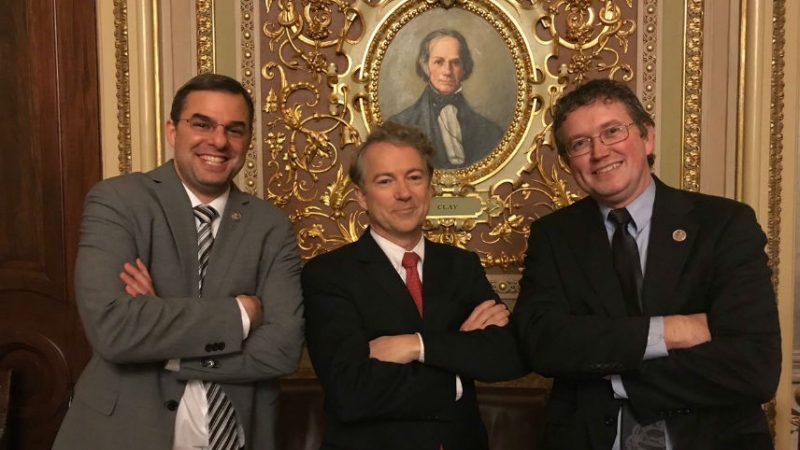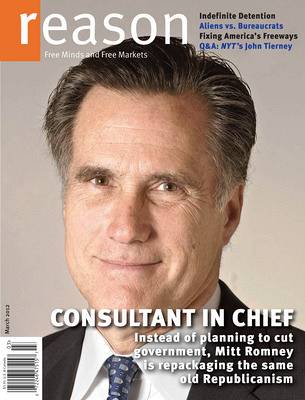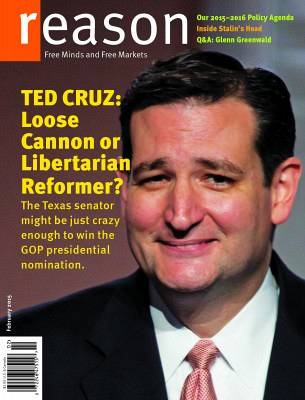How GOP Fiscal Sanity Died, in 7 Easy Steps
Here are the moments when Republicans, including professed deficit hawks, snuffed out the 2009-2014 flicker of budgetary sanity


"I ran for office because I was very critical of President Obama's trillion-dollar deficits," a rightly outraged Sen. Rand Paul (R-Ky.) said Thursday. "Now we have Republicans hand in hand with Democrats offering us trillion-dollar deficits. I can't in all honesty look the other way." Now more than ever, Rand stands nearly alone.
The turnabout in fiscal approach just since Paul's 2010 Tea Party wave election is enough to snap vertebrae. "Republicans repeal the Tea Party," ran the headline of Philip Klein's Washington Examiner piece, and it's hard to argue with his logic: "Despite many setbacks, the Tea Party had one tangible achievement to show for all of the havoc it caused: the enactment of spending caps that resulted from the 2011 standoff over raising the debt ceiling….In 2017, for the first time in the post-Tea Party era, Republicans finally gained unified control of government….They have now agreed on a deal with Democrats that would blow up the spending caps that were a legacy of the Tea Party movement—to the tune of $300 billion over the next two years."
When the first Tea Party senators and congressmen were sworn in, Washington was already filled with urgent talk of deficit reduction, spending restraints, and long-term entitlement reform. Yet eight years and $10 trillion of debt later, precisely none of that is on the table anymore from either major political party. So what the hell happened?
Democrats, who have now succumbed fully to Bernie-style fantasia when it comes to what Bill Clinton warned about in his 2012 Democratic National Convention speech ("We've got to deal with this big long-term debt problem or it will deal with us"), have surely played their role. But they haven't run Congress since 2014, nor the White House since 13 months ago. There's a deep fiscal rot at the heart of Grand Old Party.
President Donald Trump inked the final surrender Friday—junking the sequestration caps, increasing the budget on both defense and nondefense discretionary spending by more than $100 billion each, waiving the debt ceiling for another year, all after debt and inflation worries triggered one of worst week in years for the stock market. But there were many missteps taken by Republicans, including hardcore Tea Party fiscal conservatives, that led us to a point where a GOP Congress and president signed a deal that the Committee for a Responsible Budget estimates could add more than $2 trillion in debt over the next decade. "This amount of deficit increase," the CFRB observed, "is unacceptable and the result of a budget process that has recently disregarded all constraints."
Some of these decisions were defensible in the moment, others remain hotly contested, and the more recent actions in particular were plum awful from the jump. Here, in chronological order, is my list of seven key forks in the road that led us to our current fiscal box canyon.
1) December 2010: Rejecting Simpson/Bowles
Yes, there were many reasons not to back the long-term budget recommendations made by the National Commission on Fiscal Responsibility and Reform, chaired by former senators Alan Simpson and Erskine Bowles, with the goal of balancing the budget by 2020 and re-jiggering old-age entitlements so that they don't swallow the government whole when the Baby Boomers retire. The plan accepted as a baseline reality that the federal government would consume an ahistorically high share of the economy. It didn't really touch Medicare, shied away from lopping off questionable federal departments and agencies, raised taxes.
But the framework they proposed—roughly, $2 trillion in future spending cuts, $1 trillion in future tax increases (much of it in payroll taxes), raising the retirement age on and doing some means-testing for Social Security, lowering personal and corporate income taxes, ditching many tax breaks (including mortgage-interest deductions), and imposing caps on discretionary spending—had three virtues that are now totally absent from the discussion: It aimed at least semi-credibly to balance the budget in 10 years, it put Social Security on much firmer fiscal footing, and it shared responsibility between the two major parties for tackling the country's hardest budgetary question.
The proposal never got voted out of committee. Needing 14 out of 18 votes to be forwarded to the full Congress for debate and then an up-or-down vote, the deal received just 11, with the nays including three House Republicans: Jeb Hensarling (Texas), Dave Camp (Michigan), and Paul Ryan (Wisconsin). Ryan, who had the nerve in 2012 to criticize then-President Barack Obama for not supporting the same Simpson/Bowles deal he himself voted against, was a main shepherd of this week's debacle.
Simpson/Bowles was flawed, but in some ways better than what it inspired—the Budget Control Act of 2011. That law, which this week's action effectively wipes off the books, did not touch entitlements or long-term deficit reduction (aside from prompting a new Joint Select Committee on Deficit Reduction, which got much less further along than its predecessor). Instead, it included as punishment for the supercommittee's eventual failure spending caps that were lower than Simpson/Bowles', and tax hikes that were the most significant in 20 years.

2) May 2012: Choosing Mitt Romney
Romney, to a degree that escapes the notice of most political journalists, was in many ways an ideological precursor to Donald Trump. He was the GOP field's biggest hardass on immigration in 2012, and (as I wrote at that Republican National Convention), "campaigned on 'rebuilding' the military, restoring Medicare cuts, and shoring up Social Security." Sound familiar?
The Tea Party was then too embryonic to mount candidates, though Ron Paul was busy doubling up on his 2008 run. The selection of Paul Ryan has V.P. nominee was seen as a sop to emerging fiscal hawks, even though Romney rejected Ryan's most famous entitlement proposals, and the keen-eyed among us had a bad feeling about the Wisconsinite's philosophical reliability.
Still, what Romney did was prove that—counterintuitively!—you can run and win on big-government conservatism in a GOP primary even in the midst of a populist limited-government revolt. Slot that ideology into someone who actually resonates with the culture and aspirations of the fed-up grassroots, and you have, well, Donald Trump.
3) May 2013: Walking away from bicameral budget negotiations
This one's already been memory-holed, but it really shouldn't be, not least because at least one Tea Party senator, Utah's Mike Lee, was central to the dubious call.
Long story short, House Republicans in 2013, after arguably getting their bells rung on fiscal cliff negotiations at the beginning of the year, pulled off a neat switcheroo: In return for kicking the then-contentious debt-ceiling deadline down the road a few months, then-House Speaker John Boehner (R-Ohio) included as part of the deal a provision for the Senate to finally pass a damn budget, a nicety that governing Democrats in the upper chamber had all but abandoned.
Then something wondrous happened: The Senate passed a budget, and just two days after the House passed its own. One was Democratic and taxy, the other was Republican and cutty, but it was basically $3.7 trillion vs. $3.5 trillion, meaning that all you'd need was the usual partisan theatrics followed by a bipartisan conference committee that would arrive, kicking and screaming, at $3.6 trillion, essentially flat year-on-year. There have been worse outcomes.

Which Mike Lee and his pals in the Senate promptly chose. Before conference negotiations could begin, the Tea Party caucus simply refused to appoint conferees. After bitching righteously for years about the fundamental irresponsibility of not passing budgets, conservatives held their breaths and turned purple rather than finish what they'd finally managed to start. Lee claimed he was merely preventing a "backroom deal" from being foisted onto an unsuspecting public, sounding perfectly juvenile in his explanation: "We are fully aware that Washington and the establishment in both parties don't like what we're saying….In case no one's noticed, the way Washington works stinks."
All of this became precursor to the Ted Cruz/Mark Meadows October 2013 government shutdown, whose unpopularity and practical ineffectiveness would neutralize one of the Tea Party's best negotiating tools for restraining spending under Obama: the debt ceiling.
4) February 2014: Waving away the debt ceiling.
Having lost the taste for brinkmanship during the Ted Cruz adventure two months prior, Republicans first passed a Paul Ryan-negotiated budget deal lifting some of the spending caps, then resigned themselves in February 2014 to just suspend the debt ceiling for a year, no conditions attached. "Republicans are trying to put Tea Party politics in the rear view mirror," observed then-Sen. Chuck Schumer (D-NY) at the time. Boy, were they.
Literally the moment the GOP re-took control of the Senate that November, incoming Majority Leader Mitch McConnell (R-Ky.) said this: "Let me make it clear: There will be no government shutdowns and no default on the national debt." The debt-ceiling extension was soon extended through 2017; President Trump and Schumer re-upped it last September, and on Friday waved it on through until 2019.
5) April 2016: Choosing Donald Trump
Candidate Donald Trump did not spend much time talking about deficits and debts on the campaign trail, and when he did it was often nonsensical. You could almost feel the exasperation of forecasters attempting to measure the effect his various proposals would have on long-term finances.
This much is clear, though: Like Mitt Romney only moreso, Trump not only ran against but openly mocked conservative plans to trim the welfare state. Like Romney only moreso, he made extravagant promises to jack up immigration enforcement, and rebuild the allegedly depleted military. Add on top of that a trillion-dollar infrastructure ambition and some anti-Romneyesque views on Mercantilist trading policies, and you have a right-wing economic populism at odds with limited-government ideas.
Chances are more than strong that observers who detected a strong new grassroots taste for cutting government back in 2009-2010 were overrating the role of policy ideas in the Tea Party, and underrating the ideologically incoherent cultural and tribal components of it all. As the libertarian-leaning Rep. Thomas Massie (R-Ky.) told me last year, when describing his attempts to campaign in Iowa for his friend Rand Paul's presidential campaign:
I thought the libertarian ideology within the Republican party was really catching on, that it was popular. But then when I went to Iowa I saw that the same people that had voted for Ron Paul weren't voting for Rand Paul, they were voting for Donald Trump. And the same thing happened in Kentucky, the people who were my voters ended up voting for Donald Trump in the primary. And so I was in a funk because how could these people let us down? How could they go from being libertarian ideologues to voting for Donald Trump? And then I realized what it was: They weren't voting for the libertarian in the race, they were voting for the craziest son of a bitch in the race when they voted for me and Rand and Ron earlier. So Trump just won, you know, that category, but dumped the ideological baggage.
6) April 2017: Failing to pass a budget.
The Budget Control Act of 1974 lays out a process by which Congress is supposed to deliberate on and pass a dozen appropriations bills every year by certain deadlines. When out of power, Republicans bitterly noted that the law has only been followed properly four years since. Since taking control over both houses, the GOP has upheld this disreputable tradition.
The best thing you can say about this week's agreement is that at least it's a two-year bipartisan budget deal. But it still did not go through anything like a normal voting and amendment process, and if anything just puts a longer time frame on the usual business of 21st congressional work—governing through last-minute, must-pass monstrosities that no one has read.
When the 2011 Budget Control Act still placed some restraints on continuing resolutions, there was a theoretical side-benefit to the irresponsibility: At least they couldn't spend too much. Now that those shackles are officially removed, we have the worst of both worlds—congenital avoidance of deliberation and on-the-record votes, along with literally no ceiling on expenditures. Wheee!
7) October 2017: Agreeing on $1.5 trillion in new deficits
There is no greater poster child for the death of the Tea Party than Mick Mulvaney. In March 2015, the then-Freedom Caucus member of the House of Representatives, wrote a Wall Street Journal op-ed headlined: "The Republican Budget Is a Deficit Bust," which argued that "There is no honest way to justify not paying for spending, no matter how often my fellow Republicans try."
What was Mulvaney's tune just 30 months later as a key economic-policy player in the Trump administration? "We need to have new deficits." At that point the white flag was just a formality.
It came two weeks later, in the form of the Senate's 51-49 approval of a 10-year budget blueprint that—even based on hopelessly optimistic numbers—consciously raised cumulative debt by $1.5 trillion. This was the necessary parliamentary precondition for passing tax cuts on party lines two months later. After that the only real drama was exactly how the Senate's purported fiscal hawks would end up justifying voting in favor of a tax deal they had long claimed must be deficit neutral, not deficit-exploding.
---
Is there a political ticket out of this mess? Not through the Republican Party, as currently constituted. As Mulvaney presciently warned us three years ago,
Until this budget, Republicans were beginning to convince people that they were serious about reducing spending. GOP budgets in recent years have made hard decisions on everything from defense to Medicare to food stamps. Republicans had begun making the argument that all spending is subject to scrutiny. Now there is a new message: Republicans will cut things they don't like, but they lack that same conviction on things they like.
Because of the hard decisions that defense hawks and deficit hawks had made together, Republicans were gaining the moral high ground on spending. Last week we lost it, and it will be harder to regain the next time.
It will be a long time, if ever, before Republican complaints (from anyone not named Paul, Amash, or Massie) about debt, deficits, and federal spending will be met with anything but gales of laughter. The question is more whether anyone besides those three will ever bring the subject up. It's certainly not on the front burner of the party's unchallenged leader. We could soon be in a season where the only alarm bells at Washington's reckless spending will be rung not by national politicians, but by bond traders.
